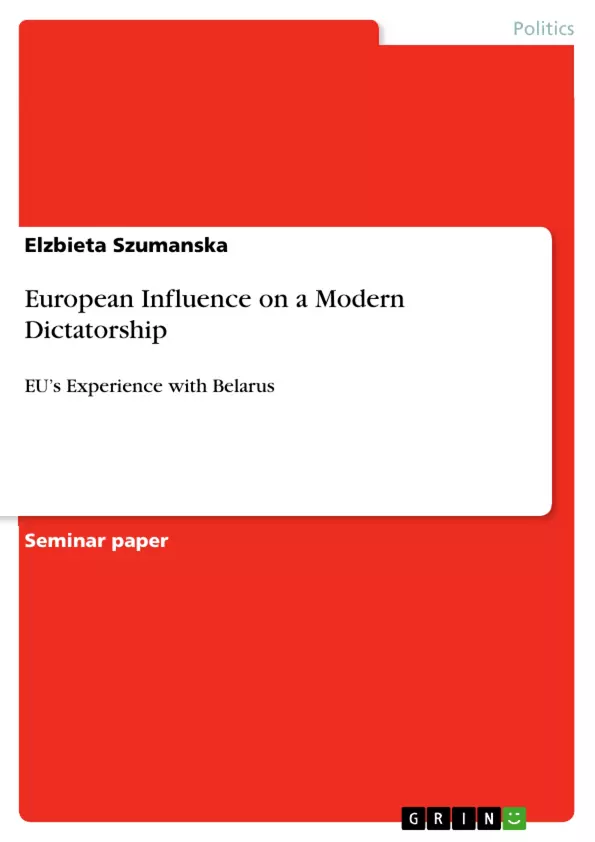Belarus became a dictatorship shortly after the young democracy there failed. Among different reasons of it not to be underestimated is the economic crisis that time and the lack of the national consciousness of Belarusians. Both made it easier to introduce violence, force order and stability mainly due to the fact that democracy was associated first of all with anarchy and empty shelves in shops. The intense relationship with Russia, mainly due to economic dependence and the Soviet tradition, caused an exclusion Belarus’ in Europe and also a self-exclusion of the
Belarusians. After several years of minimal contacts between Belarus and the West, there has been an increased interest in the region to be observed. The lesson from the past has shown that isolation and political/economic pressure do not work in case of Belarus, so that the “Serbia scenario” cannot be repeated. The main reasons for an increased interest in Belarus are the Eastern
enlargement of the European Union and the importance of resources, mainly gas and oil, flowing through the Republic from Russia. Next to the realistic approach that includes also the border
zone pragmatism, there are also idealistic reasons to be taken under consideration. The aspirations of the new member states in Central Europe and the believe of the EU that a stabile,
accountable neighborhood can be assured only through building democracy in the country made up the decision of the EU to intensify the democratization processes in Belarus.
Inhaltsverzeichnis (Table of Contents)
- Introduction
- Theoretical Background
- Interaction between the European Union and Belarus
- Conclusions
- Summary in a Foreign Language
Zielsetzung und Themenschwerpunkte (Objectives and Key Themes)
This research paper examines the EU's experience with Belarus, a modern dictatorship, and explores the effectiveness of different tools the EU can utilize to promote democratization in the country. The paper aims to analyze the EU's foreign policy towards authoritarian regimes, focusing on the case of Belarus.
- The nature of dictatorships and their relationship with Western democracies
- The EU's foreign policy towards authoritarian regimes
- The specific challenges and opportunities presented by Belarus
- The potential effectiveness of political and economic pressure, as well as sanctions, in promoting democratization
- The role of social constructivism in shaping international relations and the potential for change
Zusammenfassung der Kapitel (Chapter Summaries)
- Introduction: This chapter introduces the topic of the research paper, defining dictatorship as a regime type and highlighting the challenges it poses to Western democracies. It emphasizes the importance of understanding the EU's foreign policy towards dictatorships and explores the question of how to effectively promote democratization in authoritarian states.
- Theoretical Background: This chapter provides a theoretical framework for understanding the EU's interest in Belarus, exploring both idealistic and realistic motivations. It discusses Belarus's geopolitical significance, its historical ties to Russia, and the potential for its integration into the European Union.
Schlüsselwörter (Keywords)
The paper focuses on key concepts such as dictatorship, authoritarianism, democratization, foreign policy, European Union, Belarus, social constructivism, political pressure, economic sanctions, and geopolitical significance. These concepts are explored in relation to the EU's experience with Belarus, highlighting the complexities of promoting democracy in a country with a history of autocracy.
Frequently Asked Questions
Why did Belarus become a dictatorship after the fall of democracy?
Factors included a severe economic crisis and a lack of national consciousness, leading many to associate democracy with anarchy and economic hardship.
What is the EU's strategy for promoting democracy in Belarus?
The EU uses a mix of political pressure, economic sanctions, and democratization processes, though isolation has historically proven ineffective.
Why is Belarus geopolitically significant to the European Union?
Belarus is a key transit country for resources like oil and gas flowing from Russia to Europe, especially following the EU's Eastern enlargement.
Does economic dependence on Russia affect Belarus's European relations?
Yes, deep economic ties and Soviet traditions have historically led to Belarus's exclusion from European integration and a self-exclusion by its citizens.
Can sanctions effectively change authoritarian regimes like Belarus?
The paper discusses that while pressure exists, the "Serbia scenario" of rapid change through sanctions is difficult to repeat in Belarus due to different internal dynamics.
- Citar trabajo
- BA Elzbieta Szumanska (Autor), 2010, European Influence on a Modern Dictatorship, Múnich, GRIN Verlag, https://www.grin.com/document/147575



